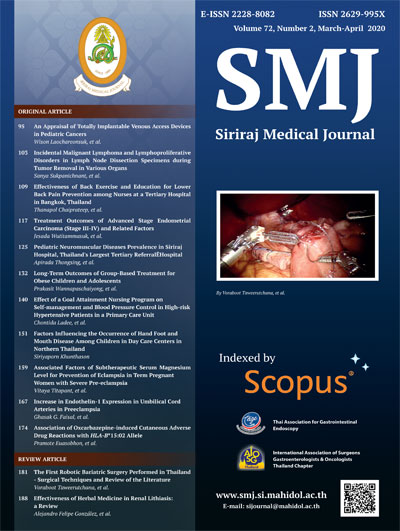Treatment Outcomes of Advanced Stage Endometrial Carcinoma (Stage III-IV) and Related Factors
DOI:
https://doi.org/10.33192/Smj.2020.16Keywords:
Advanced stage; endometrial carcinoma; prognostic factor; recurrence; survivalAbstract
Objective: The aim of this study was to determine treatment response, the recurrence rate, 3-year overall survival, 3-year recurrence-free survival, and associated prognostic factors for survival among advanced-stage endometrial carcinoma patients at Siriraj Hospital.
Methods: This study was conducted at the Division of Gynecologic Oncology, Department of Obstetrics and Gynecology, Faculty of Medicine Siriraj Hospital, Mahidol University Bangkok, Thailand. A total of 415 patients that were diagnosed with advanced-stage endometrial carcinoma during January 1998 to December 2014 were enrolled. Data retrieved from medical records included baseline characteristics, surgico-pathological reports, treatment protocol, follow-up data, treatment response, and recurrence status. Three-year survival and recurrence-free survival were estimated by Kaplan-Meier method. Various factors were analyzed for significant association with survival.
Results: Four hundred of 415 cases were included in the final analysis. There were 282 (70.5%) and 118 (29.5%) patients that were diagnosed with stage III and IV disease, respectively. Two hundred and eighty-two patients had complete response after primary treatment, and 94 (33.3%) patients had disease recurrence. The median follow-up and survival times were 24.5 and 42.5 months, respectively. The 3-year survival rate was 50%, and the median recurrence-free interval was 12.25 months. Multivariate analysis revealed high-grade tumor histology, lymph node metastasis, Eastern Cooperative Oncology Group (ECOG) performance status, and menopausal status to be significant prognostic factors for overall survival.
Conclusion: Median survival among patients with advanced-stage endometrial carcinoma after primary treatment was 3 years. The significant prognostic factors were high grade tumor histology, lymph node metastasis, ECOG performance status, and menopausal status.
References
2. Khuhaprema T, Srivatanakul P, Sriplung H, Wiangnon S, Sumitsawan Y, Attasara P. Corpus Uteri. Cancer in Thailand 2007;4:54-5.
3. Dowdy SC, Maríani A, Lurain JR. Uterine cancer. In: Berek JS, ed. Berek & Novak’s gynecology. 15th ed. Philadelphia: Lippincott, Williams & Wiikins; 2012. p.1250-93.
4. Randall ME, Filiaci VL, Muss H, Spirtos NM, Mannel RS, Fowler J, et al. Randomized phase III trial of whole-abdominal irradiation versus doxorubicin and cisplatin chemotherapy in advanced endometrial carcinoma: a Gynecologic Oncology Group Study. J Clin Oncol 2006;24:36-44.
5. Fleming GF, Brunetto VL, Cella D, Look KY, Reid GC, Munkarah AR, et al. Phase III trial of doxorubicin plus cisplatin with or without paclitaxel plus filgrastim in advanced endometrial carcinoma: A Gynecologic Oncology Group Study. J Clin Oncol 2004;22:2159-66.
6. Thigpen JT, Brady M, Homesley H, Malfetano J, DuBeshter B, Burger RA, et al. Phase III trial of doxorubicin with or without cisplatin in advanced endometrial carcinoma: A Gynecologic Oncology Group Study (GOG). J Clin Oncol 2004;22:3902-8.
7. Álvaro TG, Jesús SJ, José LM, Sara BS, Laura MM, Gregorio LG, et al. Overall survival and disease-free survival in endometrial cancer: prognostic factors in 276 patients. Onco Targets Ther 2013;6:1305-13.
8. FIGO committee on gynecologic oncology. Revised FIGO staging for carcinoma of the vulva, cervix, and endometrium. Int J Gynaecol Obstet 2009;105:103-4.
9. Eisenhauer EA, Therasse P, Bogaerts J, Schwartz LH, Sargent D, Ford R, et al. New response evaluation criteria in solid tumours: Revised RECIST guideline (version 1.1). Eur J Cancer 2009;45:228-47.
10. Chen JR, Chang TC, Fu HC, Lau HY, Chen IH, Ke YM, et al. Outcomes of patients with surgically and pathologically staged IIIA-IVB pure endometrioid-type endometrial cancer. Medicine 2016;95:1-11.
11. Howlader N, Noone A, Krapcho M, Miller D, Bishop K, Kosary C, et al. SEER Cancer Statistics Review, 1975-2014. National Cancer Institute 2017; Available from: https://seer.cancer.gov/statfacts/html/corp.html.
12. Koshiyama M, Matsumura N, Konishi I. Subtypes of ovarian cancer and ovarian cancer screening. Diagnostics (Basel) 2017;7:12.
13. Boer SMd, Powell ME, Mileshkin L, Katsaros D, Bessette P, Haie-Meder C, et al. Adjuvant chemoradiotherapy versus radiotherapy alone for woman with high risk endometrial cancer (PORTEC-3): final results of an international, open-label, multicentre, randomised phase 3 trial. Lancet Oncol 2018;19:295-309.
14. Kuku S, Williams M, McCormack M. Adjuvant Therapy in Stage III Endometrial Cancer Treatment Outcomes and Survival. A Single-Institution Retrospective Study. Int J Gynecol Cancer 2013;23:1056-64.
15. Florescu M-M, Dragomirescu M, Stepan AE, Ciurea RN, Margaritescu C, Simionescu CE. Histopathological Prognostic Factors for Endometrial Carcinoma. Curr Health Sci J 2016;42:139-44.
16. Lan C, Huang X, Huang Y, Xi S, Huang H, Feng Y, et al. The outcome and efficacy of adjuvant chemotherapy alone in patients with stage IIIA endometrial carcinoma with solitary adnexal involvement: A retrospective single-institution study. Gynecol Oncol 2014;135:446-50.
Downloads
Published
How to Cite
Issue
Section
License
Authors who publish with this journal agree to the following conditions:
Copyright Transfer
In submitting a manuscript, the authors acknowledge that the work will become the copyrighted property of Siriraj Medical Journal upon publication.
License
Articles are licensed under a Creative Commons Attribution-NonCommercial-NoDerivatives 4.0 International License (CC BY-NC-ND 4.0). This license allows for the sharing of the work for non-commercial purposes with proper attribution to the authors and the journal. However, it does not permit modifications or the creation of derivative works.
Sharing and Access
Authors are encouraged to share their article on their personal or institutional websites and through other non-commercial platforms. Doing so can increase readership and citations.















